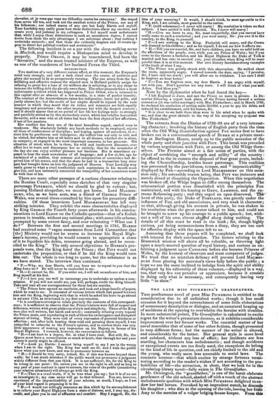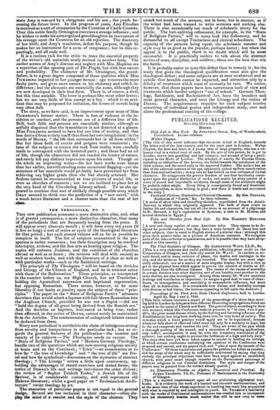THE LATE MISS PICKERING'S GRANDFATHER.
THIS posthumous novel of poor Miss PICKERING is entitled to the consideration due to all unfinished works ; though it has small occasion for it beyond the retrenchment of some little elaborations of unnecessary description or dialogue, and an unnatural heaping up of accidents at the opening to overwhelm the heroine with troubles. In more substantial points, The Grandfather is calculated to excite regret for the writer's premature decease, as it exhibits considerable improvement over her former works. The essential matter of her novel resembles that of some of her other fictions, though presented in very different forms ; but the manner of the writer is altered, and considerably for the better. Her general style is more level and subdued, without any loss of effect; her incidents are less startling, her characters less melodramatic ; and though accidents or exceptional events are too freely used, the exceptions do belong to the kind of life in question, and are chiefly limited to the old and the young, who really seem less amenable to social laws. The romantic interest—that which excites by strange fortunes termi- nating according to the reader's wishes if not according to the pro- babilities of life—the attraction, in short, that we look for in the circulating-library novel—fully exists in The Grandfather. Mr. Ormington, the "grandfather," is one of the harsh obdurate gentlemen of the old school,shaded off with a touch of the abstract melodramatic qualities with which Miss PICKERING delighted to en- dow her bad heroes. Provoked by an imprudent match, he discs* his daughter ; who dies at the opening of the tale, leaving her little Amy to the mercies of a vulgar lodging-house-keeper. From this
state Amy is rescued by a clergyman and his son ; the youth be- coming the future lover. In the progress of years, Amy Fitzallan is received as a sort of companion by the Countess of Castle Coombe. Over this noble family Ormington exercises a strange influence; and he wishes to make his unrecognized granddaughter an instrument of his revenge upon the Countess for an old rejection. The discovery of her birth, and Amy's resolution, defeat his purpose, though he makes her an instrument for a scene of vengeance ; but he dies re- pentingly, and all ends well.
It is a curious task for the critic to trace the essential property of the writer's old materials newly revived in another form. The earlier scenes of Amy's distress and neglect with Mrs. Hopkins are a repetition of the opening part of The Fright, but with less nature and probability. The character of Mr. Ormington, the grand- father, is to a great degree composed of those qualities which Miss PICKERING imparted to her younger heroes : age removes the more flashy parts, and gives more nature to his obduracy and selfish in- difference; but the elements are essentially the same, although they are now developed in their best form. There is, of course, a rival, but this time amiable. The lover is perhaps like most other lovers; but we see very little of him except as a boy : which is an acci- dent that may be proposed for imitation, the lovers of novels being very often dull.
The story, as we have said, is an improvement upon most of Miss PICKERING 'S former stories. There is less of violence in the in- cidents or conduct, and the persons are of a different line of life. Still, both fable and persons are essentially similar, although so artfully disguised that the 'resemblance is not detected at a glance. Miss PICKERING seemed to have but one idea of society, and that less derived from scciety itself than from her own imagination : in the words of MOORE, " the life that surrounds her is all from within." But her ideas both of events and perions were consistent ; the tone of the subject or scenes she took from reality were carefully made to correspond with the invented parts ; and these had an air of life, though the characters did not remind the reader of nature, and rarely left any distinct impression upon his mind. Though on the whole an improving writer—for her later works were better than her earlier, notwithstanding some occasional flagging—yet the sameness of her materials would probably have prevented her from 'achieving any higher grade than she had already attained. Her fictions cannot be recommended as true pictures of social life, or even as sketches of manners ; but we are inclined to place her at the very head of the Circulating Library school. To us she ap- peared to combine that sort of unlikely though possible story which GRAY seemed to think was the perfection of a " new novel," with a much better literature and a chaster taste than the rest of her class.



























 Previous page
Previous page